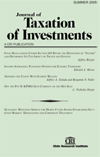When Mutual Funds Fail to Make Foreign Tax Elections: What Does the Investor Lose?
Author: Janie Casello Bouges.
Source: Volume 25, Number 03, Spring 2008 , pp.33-42(10)

< previous article |next article > |return to table of contents
Abstract:
U.S. taxing authorities have mechanisms in place to help fundholders avoid double taxation when they invest in mutual funds with portfolios that include foreign investments. One such mechanism is the Section 853 election. This paper illustrates the signifi- cant costs to investors, from both an after-tax return and cash flow perspective, when mutual fund managers fail to take full advantage of the always tax-advantageous 853 election. Further, in an attempt to apprise investors of the effect of taxes on returns, the SEC requires that after-tax returns be reported in prospectuses. This paper demonstrates that the standardized formula demanded by the SEC to report those after-tax returns always understates the actual after-tax returns, particularly for funds that provide the larger part of their returns through cash dividendsKeywords:
Affiliations:
1: University of Massachusetts Lowell.